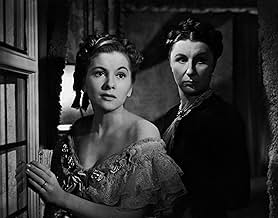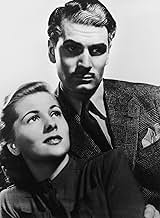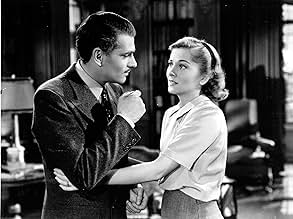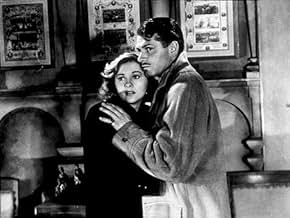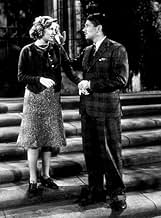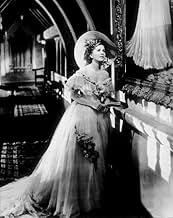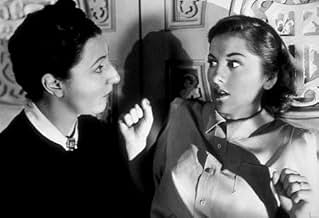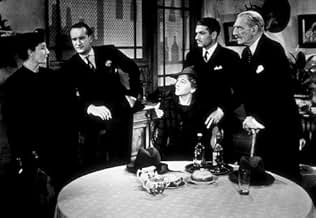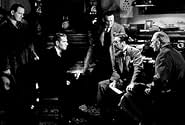Una exitosa mujer de negocios entra en un juego peligroso cuando decide seguirle la pista al hombre que la violó.Una exitosa mujer de negocios entra en un juego peligroso cuando decide seguirle la pista al hombre que la violó.Una exitosa mujer de negocios entra en un juego peligroso cuando decide seguirle la pista al hombre que la violó.
- Dirección
- Guionistas
- Elenco
- Ganó 2 premios Óscar
- 10 premios ganados y 10 nominaciones en total
Bunny Beatty
- Maid
- (sin créditos)
Billy Bevan
- Policeman
- (sin créditos)
Resumen
Reviewers say 'Rebecca' is acclaimed for its atmospheric storytelling and psychological tension, showcasing Alfred Hitchcock's masterful direction. The film's haunting ambiance, complex characters, and enigmatic Rebecca are highlighted. Key themes include identity, memory, and the struggle of the second Mrs. de Winter. Performances by Joan Fontaine, Laurence Olivier, and Judith Anderson are praised. Cinematography and set design enhance the gothic suspense. Some find the plot uneven and the ending less satisfying, but it remains a significant work in Hitchcock's career.
Opiniones destacadas
This fine classic combines a great director, a great story, and a great cast. Any one of those would have made for a good movie, but all three make it an excellent one. Hitchcock's style and eye for detail combine very well with a story (from a novel that is extremely good in its own right) filled with psychological fear and settings that are interesting and suggestive.
Most of the time the story itself moves fairly slowly, allowing the focus to be on the characters, but there are also a couple of very good plot twists, which can be very surprising if you've not seen the movie or read the novel. So if you happen not to know the story, it's a good idea to see the film before reading a lot of comments about it. Laurence Olivier, Joan Fontaine, Judith Anderson, and George Sanders are all perfectly cast and do a wonderful job bringing their characters to life, and making you feel a part of the story.
"Rebecca" should be satisfying not only to any Hitchcock fan, but to anyone who likes classic movies. Whether you like romance, suspense, or drama, they're all here, and put together by a director and cast that are masters of their art.
Most of the time the story itself moves fairly slowly, allowing the focus to be on the characters, but there are also a couple of very good plot twists, which can be very surprising if you've not seen the movie or read the novel. So if you happen not to know the story, it's a good idea to see the film before reading a lot of comments about it. Laurence Olivier, Joan Fontaine, Judith Anderson, and George Sanders are all perfectly cast and do a wonderful job bringing their characters to life, and making you feel a part of the story.
"Rebecca" should be satisfying not only to any Hitchcock fan, but to anyone who likes classic movies. Whether you like romance, suspense, or drama, they're all here, and put together by a director and cast that are masters of their art.
This is a Daphne Du Maurier's story (from a best-seller novel) concerning a prominent widower (Laurence Olivier) called Maxim De Winter who finds a gorgeous and timid young girl (Joan Fontaine) who is serving to an old Mistress (Florence Bates) . They are married and head to Manderley , the familiar mansion (in the exterior actually is a scale model). But Maxim is haunted by the ghost first wife , an enigmatic Rebecca , who died in mysterious circumstances . There works as a servant the creepy and obsessive housekeeper , Mrs Danvers (Judith Anderson,a famous stage actress in her most important role) and sh meets a cynic gentleman (George Sanders).
This film has suspense , romance , unlimited tension , full of lingering images and with the typical touches Hitchcock . Besides , a literately and thoughtful dialog signed by Joan Harrison (Hitchcock's usual screenwriter) though lacking humor . After ¨39 steps¨and ¨Jamaica Inn¨ , Hitch was encouraged to go to America and promptly shot his first work in Hollywood hired by the great producer David O'Selznick . Fine performance by Laurence Olivier , he married Vivien Leigh and he wished to her as protagonist but Hitch hired Joan Fontaine who took seven rehearsal sessions until the engaging . Joan Fontaine as a shy bride young is superb and enjoyable . Judith Anderson as a spooky and cold house keeper is top-notch, her role as obsessed person by the glamorous Rebecca is unforgotten and immortal . Atmospheric and perceptible music by Franz Waxman and sensational visual style by the cameraman George Barnes . The picture won Academy Awards for Best film and cinematography . The movie was brilliantly directed by the Master of Suspense . It's remade in inferior versions for Television, the 1980 adaptation with Jeremy Brett as Maxim and 1996 rendition with Charles Dance and Emilie Fox . The motion picture is indispensable watching for Hithcock lovers achieving the maximum impact on his audience.
This film has suspense , romance , unlimited tension , full of lingering images and with the typical touches Hitchcock . Besides , a literately and thoughtful dialog signed by Joan Harrison (Hitchcock's usual screenwriter) though lacking humor . After ¨39 steps¨and ¨Jamaica Inn¨ , Hitch was encouraged to go to America and promptly shot his first work in Hollywood hired by the great producer David O'Selznick . Fine performance by Laurence Olivier , he married Vivien Leigh and he wished to her as protagonist but Hitch hired Joan Fontaine who took seven rehearsal sessions until the engaging . Joan Fontaine as a shy bride young is superb and enjoyable . Judith Anderson as a spooky and cold house keeper is top-notch, her role as obsessed person by the glamorous Rebecca is unforgotten and immortal . Atmospheric and perceptible music by Franz Waxman and sensational visual style by the cameraman George Barnes . The picture won Academy Awards for Best film and cinematography . The movie was brilliantly directed by the Master of Suspense . It's remade in inferior versions for Television, the 1980 adaptation with Jeremy Brett as Maxim and 1996 rendition with Charles Dance and Emilie Fox . The motion picture is indispensable watching for Hithcock lovers achieving the maximum impact on his audience.
Director Alfred Hitchcock is renowned for his visual acuity, creating some of the most memorable shots in movie history; he also had a keen eye for beauty, casting some of Hollywood's most stunning actresses in iconic roles: Grace Kelly in Rear Window, Maureen O'Hara in Jamaica Inn, Tippi Hedren in The Birds, Ingrid Bergman in Spellbound, and Janet Leigh in Psycho, to name but a few. Perhaps his most enchanting leading lady was Joan Fontaine, who won an Oscar for her role in Suspicion (1941), but who was never more appealing than in her first film for Hitch, Rebecca, based on a novel by Daphne Du Maurier.
The gorgeous Fontaine plays a meek young woman (we never discover her name, but she's not the 'Rebecca' of the title) who falls for rich aristocrat 'Maxim' de Winter (Laurence Olivier) while working in the South of France. Equally besotted, Maxim proposes to the self-effacing beauty, and takes her back to his ancestral home, Manderley, which he once shared with his first wife Rebecca, before she drowned in a boating accident. The new Mrs. de Winter does her best to adapt to her new lifestyle, but is constantly under the shadow of her predecessor, with stern housekeeper Mrs. Danvers (Judith Anderson) being particularly disapproving of Maxim's new bride, deliberately driving a wedge between the married couple and even going so far as to try and talk Mrs. de Winter Mk. II into killing herself.
Thus far, the film is pure melodrama and sappy romance, and avid Hitchcock fans might be wondering where the murder and mystery is; worry, not, for this comes in the second half of the film and provides plenty of intrigue and suspense as Maxim reveals what really happened to his first wife and is subsequently suspected of her murder. Both his wife and the viewer are aware of his innocence, but with Rebecca's lover Jack Favell (George Sanders) accusing Mr. de Winter of murder, and plenty of damning evidence, things are looking pretty bad for the poor fellow. It all wraps up nicely in the end, of course, but there are plenty of tense moments along the way, all handled in the director's typically assured manner, with bags of atmosphere and sumptuous cinematography.
But as great as the direction and story are, it is the performances that really make Rebecca a winner: Olivier is perfect as the troubled toff, Anderson is wonderfully wicked as scheming housekeeper Danvers, nobody does 'bumbling oaf' quite as well as Nigel Bruce (playing Major Giles Lacy, who puts his foot in his mouth whenever he speaks), Sanders is suitably slimy as adulterous blackmailer Favell, and Fontaine... well, she is completely captivating, every smile, every tilt of her head, and every nervous glance guaranteed to win over the viewer (she was nominated for Best Actress in a Leading Role at the Oscars, but lost to Ginger Rogers). Hell, even the dog that played Maxim's mutt Jasper was excellent (so cute!).
The gorgeous Fontaine plays a meek young woman (we never discover her name, but she's not the 'Rebecca' of the title) who falls for rich aristocrat 'Maxim' de Winter (Laurence Olivier) while working in the South of France. Equally besotted, Maxim proposes to the self-effacing beauty, and takes her back to his ancestral home, Manderley, which he once shared with his first wife Rebecca, before she drowned in a boating accident. The new Mrs. de Winter does her best to adapt to her new lifestyle, but is constantly under the shadow of her predecessor, with stern housekeeper Mrs. Danvers (Judith Anderson) being particularly disapproving of Maxim's new bride, deliberately driving a wedge between the married couple and even going so far as to try and talk Mrs. de Winter Mk. II into killing herself.
Thus far, the film is pure melodrama and sappy romance, and avid Hitchcock fans might be wondering where the murder and mystery is; worry, not, for this comes in the second half of the film and provides plenty of intrigue and suspense as Maxim reveals what really happened to his first wife and is subsequently suspected of her murder. Both his wife and the viewer are aware of his innocence, but with Rebecca's lover Jack Favell (George Sanders) accusing Mr. de Winter of murder, and plenty of damning evidence, things are looking pretty bad for the poor fellow. It all wraps up nicely in the end, of course, but there are plenty of tense moments along the way, all handled in the director's typically assured manner, with bags of atmosphere and sumptuous cinematography.
But as great as the direction and story are, it is the performances that really make Rebecca a winner: Olivier is perfect as the troubled toff, Anderson is wonderfully wicked as scheming housekeeper Danvers, nobody does 'bumbling oaf' quite as well as Nigel Bruce (playing Major Giles Lacy, who puts his foot in his mouth whenever he speaks), Sanders is suitably slimy as adulterous blackmailer Favell, and Fontaine... well, she is completely captivating, every smile, every tilt of her head, and every nervous glance guaranteed to win over the viewer (she was nominated for Best Actress in a Leading Role at the Oscars, but lost to Ginger Rogers). Hell, even the dog that played Maxim's mutt Jasper was excellent (so cute!).
I spent the majority of this film thinking about how lucky M. Olivier really was. To be able to wrap his arms around Joan Fontaine and kiss her. Oh my. She's one of the most beautiful women I've ever seen (almost, but not quite as beautiful as Veronica Lake). She's also absolutely perfect in the role of the second Mrs. DeWinter, taking a character that could have become a cloying bore in less capable hands and transforming her into a sympathetic and interesting figure.
The movie, on the whole, is similarly amazing, capturing the spirit and the tone of those great Gothic romances. Watching Rebecca, I was reminded (pleasantly) of Wuthering Heights; I do not mean to suggest that in some way this film re-tells the tale of Cathy and Heathcliff, but rather that Rebecca has the feel of Bronte's novel (I am most certainly not talking about the William Wyler adaptation a few years before the release of Rebecca. That's a terrible film that somehow manages to mis-interpret the novel).
I must assume that the guiding hand of Hitchcock played no small role in recreating the feel of a Gothic romance. There are very few that would be able to take a love story, infuse it with such gloom, with such a sense of foreboding, and still manage to create something that ends happily without it feeling like a cop-out. I'd also like to draw everyone's attention to the incredibly moving section of the film that occurs between the arrival of the second Mrs. DeWinter at Mandalay and the masqued ball. The emotional strain on the Joan Fontaine character is so palpable, so absolutely taxing, that it actually pains me to watch. I hurt along with her. Few other movies affect me so emotionally - one of them is Vertigo.
All in all, this is a fantastic piece of film-making from Hollywood's golden age. Laurence Olivier is in top-form, as he plays the quiet, sad Maxim and George Sanders is positively hateful.
10/10 - a visceral masterpiece
The movie, on the whole, is similarly amazing, capturing the spirit and the tone of those great Gothic romances. Watching Rebecca, I was reminded (pleasantly) of Wuthering Heights; I do not mean to suggest that in some way this film re-tells the tale of Cathy and Heathcliff, but rather that Rebecca has the feel of Bronte's novel (I am most certainly not talking about the William Wyler adaptation a few years before the release of Rebecca. That's a terrible film that somehow manages to mis-interpret the novel).
I must assume that the guiding hand of Hitchcock played no small role in recreating the feel of a Gothic romance. There are very few that would be able to take a love story, infuse it with such gloom, with such a sense of foreboding, and still manage to create something that ends happily without it feeling like a cop-out. I'd also like to draw everyone's attention to the incredibly moving section of the film that occurs between the arrival of the second Mrs. DeWinter at Mandalay and the masqued ball. The emotional strain on the Joan Fontaine character is so palpable, so absolutely taxing, that it actually pains me to watch. I hurt along with her. Few other movies affect me so emotionally - one of them is Vertigo.
All in all, this is a fantastic piece of film-making from Hollywood's golden age. Laurence Olivier is in top-form, as he plays the quiet, sad Maxim and George Sanders is positively hateful.
10/10 - a visceral masterpiece
Hitchcock's first American movie, a word, American that is, that should be put in quotes because as Hitchcock pointed out, all of the cast and almost all of the crew were British. The film has already garnered so many comments that I'll avoid repeating most of them. The plot I'm sure has been thoroughly outlined and professionally analyzed but a few points are worth emphasis.
The plot of very precisely structured. It consists basically of a man who is the dream of many women in the 1940s audience: ruggedly handsome, intelligent, keen witted, a bit commanding but not too much, fabulously wealthy, a touch roguish, and mysterious. It's the mystery that provides the plot engine. Every incident of his past emotional life needs to be pried out of Maxim deWinter (what a name, suggesting frigidity and distance) as if it were an abcessed tooth. Each secret, as he reveals it, is a surprise to his wife. Except for the final secret uncovered in the plot, which surprises everybody. Maxim could clear the whole mystery up with an hour's worth of private conversation with his wife. But of course he doesn't, or else there would be no story. That's why Hamlet takes so long to slaughter Claudius. And why the Indians don't shoot the horses as they're chasing the stagecoach.
The acting. Olivier is extremely good at impersonating deWinter with all his charm and challenge. George Sanders is the best cad that the movies ever produced, and he proves it again here. Mrs. Danvers has a face and an expression that looks like an ice sculpture. The implicit lesbianism in her character of course had to remain implicit, but it is still rather a shock when she tenderly unfolds Mrs. DeWinter's nightie and says smoothly, "Look, you can see my hand through it." As for Joan Fontaine, a friend in Ireland said of her performance, "She does the shivering wife very well." Precisely put. With her delicate bone structure, fragile looking limbs, and her overall ikabani flower arrangement appearance, her wide asymmetrical eyes, with one brow arching up over her pale forehead, she looks about to faint with fright through half the movie. The only thing coarse about her is her wardrobe: bulky knit sweaters over her girlish bosom, long flapping drab skirts over her small but saucy rump, and those clodhoppers she wears while clunking about the house. She does the shivering naif in at least two other films of the period -- Hitchcock's "Suspicion" and "Jane Eyre." In fact, rummaging through the disarranged attic that is my long-term memory, I can't really remember her "doing" any other role.
It's the closest Hitchcock ever came to making what was then called "a woman's picture." It received a "best picture" Oscar, which went to Selznick. Something Hitchcock seemed to resent for the remainder of his life. It was a commercial and critical success and it deserved to be.
The plot of very precisely structured. It consists basically of a man who is the dream of many women in the 1940s audience: ruggedly handsome, intelligent, keen witted, a bit commanding but not too much, fabulously wealthy, a touch roguish, and mysterious. It's the mystery that provides the plot engine. Every incident of his past emotional life needs to be pried out of Maxim deWinter (what a name, suggesting frigidity and distance) as if it were an abcessed tooth. Each secret, as he reveals it, is a surprise to his wife. Except for the final secret uncovered in the plot, which surprises everybody. Maxim could clear the whole mystery up with an hour's worth of private conversation with his wife. But of course he doesn't, or else there would be no story. That's why Hamlet takes so long to slaughter Claudius. And why the Indians don't shoot the horses as they're chasing the stagecoach.
The acting. Olivier is extremely good at impersonating deWinter with all his charm and challenge. George Sanders is the best cad that the movies ever produced, and he proves it again here. Mrs. Danvers has a face and an expression that looks like an ice sculpture. The implicit lesbianism in her character of course had to remain implicit, but it is still rather a shock when she tenderly unfolds Mrs. DeWinter's nightie and says smoothly, "Look, you can see my hand through it." As for Joan Fontaine, a friend in Ireland said of her performance, "She does the shivering wife very well." Precisely put. With her delicate bone structure, fragile looking limbs, and her overall ikabani flower arrangement appearance, her wide asymmetrical eyes, with one brow arching up over her pale forehead, she looks about to faint with fright through half the movie. The only thing coarse about her is her wardrobe: bulky knit sweaters over her girlish bosom, long flapping drab skirts over her small but saucy rump, and those clodhoppers she wears while clunking about the house. She does the shivering naif in at least two other films of the period -- Hitchcock's "Suspicion" and "Jane Eyre." In fact, rummaging through the disarranged attic that is my long-term memory, I can't really remember her "doing" any other role.
It's the closest Hitchcock ever came to making what was then called "a woman's picture." It received a "best picture" Oscar, which went to Selznick. Something Hitchcock seemed to resent for the remainder of his life. It was a commercial and critical success and it deserved to be.
Oscars Best Picture Winners, Ranked
Oscars Best Picture Winners, Ranked
See the complete list of Oscars Best Picture winners, ranked by IMDb ratings.
¿Sabías que…?
- TriviaOver 20 actresses were screen-tested for the role of Mrs. de Winter, which eventually went to newcomer Joan Fontaine. One of them was Vivien Leigh, for whom Sir Laurence Olivier was pressing, as they were a couple at the time.
- ErroresIn the outside take of Manderley seen in the scene where the Narrator stares at one window being closed, it's a miniature, as is the 'Mrs Danvers' dummy dressed in black. You can realize this by the motion of the window as it's being closed, not in a continuous way, but by little fast jumps, which look too unreal.
- Citas
[the new Mrs. de Winter wants to dispose of Rebecca's letters]
The Second Mrs. de Winter: I want you to get rid of all these things.
Mrs. Danvers: But these are Mrs. de Winter's things.
The Second Mrs. de Winter: *I* am Mrs. de Winter now!
- Créditos curiososThe original 1940 credits read "Selznick International presents its picturization of Daphne Du Maurier's 'Rebecca'". The credits on the re-issue version read "The Selznick Studio presents its production of Daphne Du Maurier's 'Rebecca'".
- Versiones alternativasThe opening credits were re-done (with different font) for the 1950's re-release of the movie. It is these credits that have turned up on all telecasts of the film (even as recently as 2013) and all previous video releases. The Criterion release (which is now only available through outlet stores) restores all of the credits to their original form.
- ConexionesEdited into The Last Tycoon: Pilot (2016)
- Bandas sonorasLove's Old Sweet Song (Just a Song at Twilight)
(1884) (uncredited)
Music by J.L. Molloy
Hummed by Joan Fontaine
Selecciones populares
Inicia sesión para calificar y agrega a la lista de videos para obtener recomendaciones personalizadas
- How long is Rebecca?Con tecnología de Alexa
- In what year or era is this Movie set? Was it considered a modern movie in it's day?
- What is 'Rebecca' about?
- Is this movie based on a book?
Detalles
Taquilla
- Presupuesto
- USD 1,288,000 (estimado)
- Total a nivel mundial
- USD 113,328
- Tiempo de ejecución2 horas 10 minutos
- Color
- Relación de aspecto
- 1.37 : 1
Contribuir a esta página
Sugiere una edición o agrega el contenido que falta

Principales brechas de datos
What was the official certification given to Rebeca, una mujer inolvidable (1940) in Canada?
Responda


